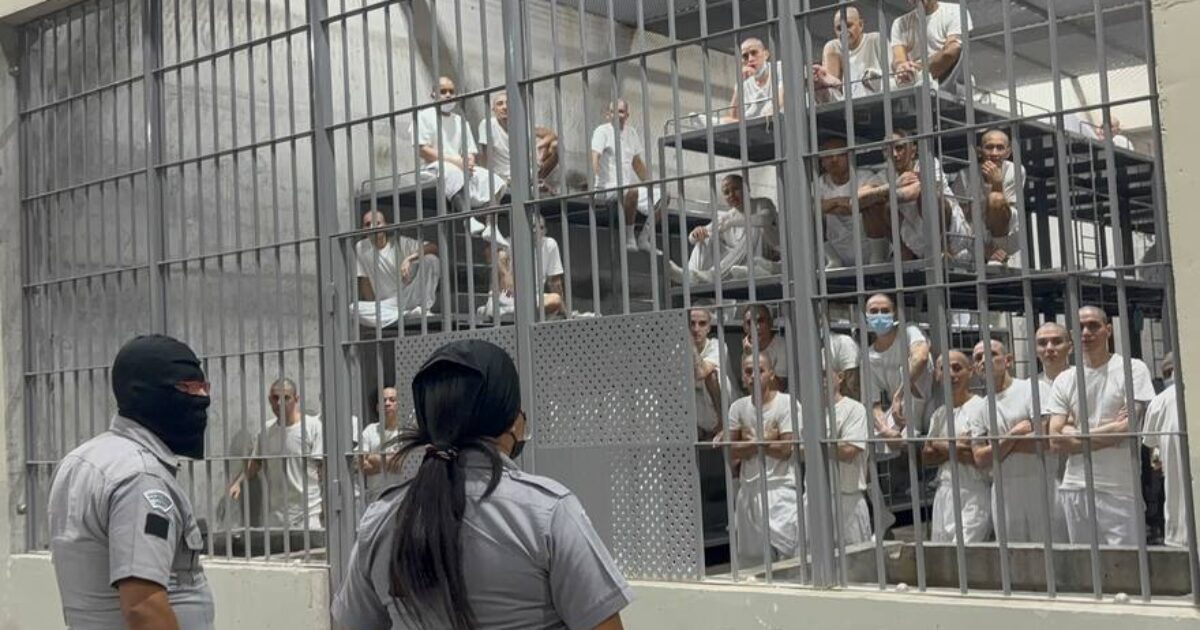El Salvador’s Terrorism Confinement Center (CECOT). Photo courtesy of La Nación.
The recent deportation of MS-13 gang member and Salvadoran citizen Kilmar Ábrego García, whose gang affiliation invalidated his U.S. residency, has drawn attention to the Salvadoran prison where he is now being held. El Salvador’s Terrorism Confinement Center (CECOT) is the brainchild of President Nayib Bukele, who operated on the premise that anyone bearing gang tattoos was likely a member, since non-gang-members with gang tattoos were often killed by gang members. Bukele tasked his police and military forces with rounding up known gang members and domestic terrorists, many of whom are now locked away in this ultra-secure facility.
Since the crackdown began in March 2022, El Salvador’s murder rate has dropped from 52 per 100,000 people in 2018 to just 2.4 per 100,000 in 2023. The country, once considered one of the most dangerous in Latin America, is now ranked among the safest in the region.
There have been some foreign nationals sent there as well, including deportees from the United States and more are expected. However, these are individuals believed to be gang members or affiliated with transnational criminal networks, not ordinary visa overstayers or migrants. Claims that all deportees are being locked up in CECOT are factually incorrect.
In early 2023, President Nayib Bukele unveiled the Centro de Confinamiento del Terrorismo (CECOT), a massive maximum-security facility in Tecoluca designed to dismantle the operations of El Salvador’s most dangerous gangs. With a capacity of up to 40,000 inmates, it is the largest prison in the Western Hemisphere and a centerpiece of Bukele’s broader anti-gang campaign launched under a state of exception declared in March 2022 after a sharp spike in homicides.
CECOT was built with one purpose: to isolate individuals with confirmed or suspected ties to violent criminal networks such as MS-13, Barrio 18, and the Venezuelan-born El Tren de Aragua. These organizations—designated as terrorist groups by the United States—are not ordinary gangs but transnational threats. Accordingly, detainees are treated not merely as criminals, but as domestic terrorists.
Since the crackdown began, Salvadoran authorities have arrested over 75,000 suspected affiliates. By targeting leadership and cutting communication lines, the government has effectively dismantled the structure that once allowed gangs to extort, traffic, and kill with impunity. CECOT plays a central role in this strategy, ensuring that high-risk offenders are locked down and unable to direct criminal activity from behind bars—a key flaw of the country’s previous prison system.
In Latin America, many prisons are effectively controlled by organized crime. CECOT, by contrast, remains fully under government authority. Located in a remote region near the San Vicente volcano, 75 kilometers from San Salvador, it is physically and technologically cut off from the outside world. There is no internet or cell service in or around the facility, and signal-blocking extends for 1.5 miles in every direction. There are no phone calls, no visits, and no messages—prisoners are completely isolated. This eliminates any possibility of coordinating gang activity beyond the walls.
Surveillance is total. The prison spans 57 acres and is surrounded by two 9-meter-high concrete walls topped with barbed wire, electrified fences, and gravel flooring designed to amplify footfalls. Nineteen guard towers provide full perimeter visibility. Inside, each of the 256 cells—each housing an average of 156 inmates—is monitored around the clock with CCTV and armed oversight from lattice ceilings. Guards live on-site, are rotated regularly, and their identities are concealed to prevent intimidation or retaliation against their families. Everyone entering the prison, including staff, is subject to physical searches and X-ray scans, reducing opportunities for contraband smuggling and corruption.
Movement inside the facility is minimal. Inmates are shackled and bent at the waist during transfers, allowed only 30 minutes a day for exercise, Bible study, or virtual hearings. High-risk individuals may be held in solitary confinement for up to 15 days in pitch-black cells with a concrete bed and a single ceiling hole for light. The majority of inmates spend 23.5 hours a day in overcrowded cells, with up to 80 people in less than one square meter of space each. There are no mattresses, no utensils, and no educational or recreational programs. Meals are served directly on the floor. The goal is not rehabilitation, but containment.
To prevent any chance of inmate control or rebellion, guards maintain overwhelming dominance. The facility is staffed by 600 soldiers, 250 police officers, and a riot intervention squad—over 1,000 personnel in total. Hooded guards armed with rifles enforce discipline. Inmates are forbidden from making eye contact with anyone, must wear white uniforms, and have their heads shaved to strip away individuality. Psychological control is further maintained through constant artificial lighting and verbal degradation. Many detainees are facing sentences that stretch for centuries or are held without trial under the ongoing state of exception. The government has made it clear: most of them will never leave.
Since its opening in January 2023, no escape attempts or prison riots have been reported. The level of control inside CECOT makes it one of the most secure prisons in the Western Hemisphere.
Despite what the mainstream media would have you believe, CECOT is not a detention center for migrants or individuals deported for minor offenses. It is a facility designed to isolate those considered serious threats due to criminal affiliations. Bukele’s strategy is brutally simple: if you lock up the gang members and make prison a place no one wants to end up, crime goes down. First, because the criminals are behind bars. Second, because no one wants to join a gang if it means ending up in a facility like CECOT.
The strict discipline and surveillance measures at CECOT are not excesses—they are necessary to prevent it from becoming yet another gang-run prison, as is common across much of Latin America. While international NGOs, liberal commentators, foreign media, and academic circles have voiced criticism, the results are hard to dispute: violence in El Salvador has plummeted. The critics had decades to offer a better solution. They didn’t, and still haven’t. Bukele acted and crime dropped.
The post Kilmar Ábrego García and the Prison That Crushed El Salvador’s Gangs appeared first on The Gateway Pundit.











